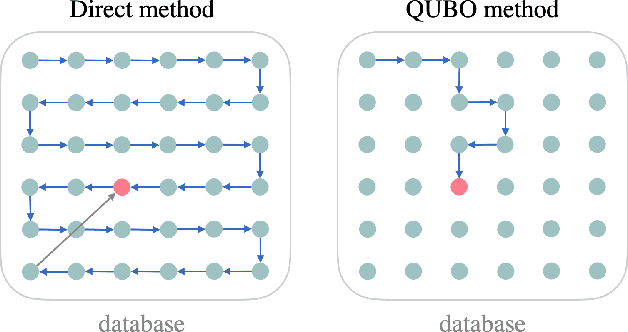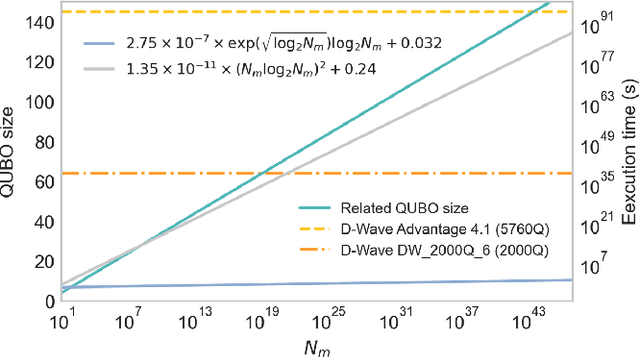Chen-Yu Liu
Quantum-Enhanced Parameter-Efficient Learning for Typhoon Trajectory Forecasting
May 14, 2025



Abstract:Typhoon trajectory forecasting is essential for disaster preparedness but remains computationally demanding due to the complexity of atmospheric dynamics and the resource requirements of deep learning models. Quantum-Train (QT), a hybrid quantum-classical framework that leverages quantum neural networks (QNNs) to generate trainable parameters exclusively during training, eliminating the need for quantum hardware at inference time. Building on QT's success across multiple domains, including image classification, reinforcement learning, flood prediction, and large language model (LLM) fine-tuning, we introduce Quantum Parameter Adaptation (QPA) for efficient typhoon forecasting model learning. Integrated with an Attention-based Multi-ConvGRU model, QPA enables parameter-efficient training while maintaining predictive accuracy. This work represents the first application of quantum machine learning (QML) to large-scale typhoon trajectory prediction, offering a scalable and energy-efficient approach to climate modeling. Our results demonstrate that QPA significantly reduces the number of trainable parameters while preserving performance, making high-performance forecasting more accessible and sustainable through hybrid quantum-classical learning.
Distributed Quantum Neural Networks on Distributed Photonic Quantum Computing
May 13, 2025Abstract:We introduce a distributed quantum-classical framework that synergizes photonic quantum neural networks (QNNs) with matrix-product-state (MPS) mapping to achieve parameter-efficient training of classical neural networks. By leveraging universal linear-optical decompositions of $M$-mode interferometers and photon-counting measurement statistics, our architecture generates neural parameters through a hybrid quantum-classical workflow: photonic QNNs with $M(M+1)/2$ trainable parameters produce high-dimensional probability distributions that are mapped to classical network weights via an MPS model with bond dimension $\chi$. Empirical validation on MNIST classification demonstrates that photonic QT achieves an accuracy of $95.50\% \pm 0.84\%$ using 3,292 parameters ($\chi = 10$), compared to $96.89\% \pm 0.31\%$ for classical baselines with 6,690 parameters. Moreover, a ten-fold compression ratio is achieved at $\chi = 4$, with a relative accuracy loss of less than $3\%$. The framework outperforms classical compression techniques (weight sharing/pruning) by 6--12\% absolute accuracy while eliminating quantum hardware requirements during inference through classical deployment of compressed parameters. Simulations incorporating realistic photonic noise demonstrate the framework's robustness to near-term hardware imperfections. Ablation studies confirm quantum necessity: replacing photonic QNNs with random inputs collapses accuracy to chance level ($10.0\% \pm 0.5\%$). Photonic quantum computing's room-temperature operation, inherent scalability through spatial-mode multiplexing, and HPC-integrated architecture establish a practical pathway for distributed quantum machine learning, combining the expressivity of photonic Hilbert spaces with the deployability of classical neural networks.
Quantum Walks-Based Adaptive Distribution Generation with Efficient CUDA-Q Acceleration
Apr 18, 2025Abstract:We present a novel Adaptive Distribution Generator that leverages a quantum walks-based approach to generate high precision and efficiency of target probability distributions. Our method integrates variational quantum circuits with discrete-time quantum walks, specifically, split-step quantum walks and their entangled extensions, to dynamically tune coin parameters and drive the evolution of quantum states towards desired distributions. This enables accurate one-dimensional probability modeling for applications such as financial simulation and structured two-dimensional pattern generation exemplified by digit representations(0~9). Implemented within the CUDA-Q framework, our approach exploits GPU acceleration to significantly reduce computational overhead and improve scalability relative to conventional methods. Extensive benchmarks demonstrate that our Quantum Walks-Based Adaptive Distribution Generator achieves high simulation fidelity and bridges the gap between theoretical quantum algorithms and practical high-performance computation.
Toward Large-Scale Distributed Quantum Long Short-Term Memory with Modular Quantum Computers
Mar 18, 2025Abstract:In this work, we introduce a Distributed Quantum Long Short-Term Memory (QLSTM) framework that leverages modular quantum computing to address scalability challenges on Noisy Intermediate-Scale Quantum (NISQ) devices. By embedding variational quantum circuits into LSTM cells, the QLSTM captures long-range temporal dependencies, while a distributed architecture partitions the underlying Variational Quantum Circuits (VQCs) into smaller, manageable subcircuits that can be executed on a network of quantum processing units. We assess the proposed framework using nontrivial benchmark problems such as damped harmonic oscillators and Nonlinear Autoregressive Moving Average sequences. Our results demonstrate that the distributed QLSTM achieves stable convergence and improved training dynamics compared to classical approaches. This work underscores the potential of modular, distributed quantum computing architectures for large-scale sequence modelling, providing a foundation for the future integration of hybrid quantum-classical solutions into advanced Quantum High-performance computing (HPC) ecosystems.
Quantum-Train-Based Distributed Multi-Agent Reinforcement Learning
Dec 12, 2024


Abstract:In this paper, we introduce Quantum-Train-Based Distributed Multi-Agent Reinforcement Learning (Dist-QTRL), a novel approach to addressing the scalability challenges of traditional Reinforcement Learning (RL) by integrating quantum computing principles. Quantum-Train Reinforcement Learning (QTRL) leverages parameterized quantum circuits to efficiently generate neural network parameters, achieving a \(poly(\log(N))\) reduction in the dimensionality of trainable parameters while harnessing quantum entanglement for superior data representation. The framework is designed for distributed multi-agent environments, where multiple agents, modeled as Quantum Processing Units (QPUs), operate in parallel, enabling faster convergence and enhanced scalability. Additionally, the Dist-QTRL framework can be extended to high-performance computing (HPC) environments by utilizing distributed quantum training for parameter reduction in classical neural networks, followed by inference using classical CPUs or GPUs. This hybrid quantum-HPC approach allows for further optimization in real-world applications. In this paper, we provide a mathematical formulation of the Dist-QTRL framework and explore its convergence properties, supported by empirical results demonstrating performance improvements over centric QTRL models. The results highlight the potential of quantum-enhanced RL in tackling complex, high-dimensional tasks, particularly in distributed computing settings, where our framework achieves significant speedups through parallelization without compromising model accuracy. This work paves the way for scalable, quantum-enhanced RL systems in practical applications, leveraging both quantum and classical computational resources.
Quantum-Trained Convolutional Neural Network for Deepfake Audio Detection
Oct 11, 2024



Abstract:The rise of deepfake technologies has posed significant challenges to privacy, security, and information integrity, particularly in audio and multimedia content. This paper introduces a Quantum-Trained Convolutional Neural Network (QT-CNN) framework designed to enhance the detection of deepfake audio, leveraging the computational power of quantum machine learning (QML). The QT-CNN employs a hybrid quantum-classical approach, integrating Quantum Neural Networks (QNNs) with classical neural architectures to optimize training efficiency while reducing the number of trainable parameters. Our method incorporates a novel quantum-to-classical parameter mapping that effectively utilizes quantum states to enhance the expressive power of the model, achieving up to 70% parameter reduction compared to classical models without compromising accuracy. Data pre-processing involved extracting essential audio features, label encoding, feature scaling, and constructing sequential datasets for robust model evaluation. Experimental results demonstrate that the QT-CNN achieves comparable performance to traditional CNNs, maintaining high accuracy during training and testing phases across varying configurations of QNN blocks. The QT framework's ability to reduce computational overhead while maintaining performance underscores its potential for real-world applications in deepfake detection and other resource-constrained scenarios. This work highlights the practical benefits of integrating quantum computing into artificial intelligence, offering a scalable and efficient approach to advancing deepfake detection technologies.
CompressedMediQ: Hybrid Quantum Machine Learning Pipeline for High-Dimentional Neuroimaging Data
Sep 13, 2024



Abstract:This paper introduces CompressedMediQ, a novel hybrid quantum-classical machine learning pipeline specifically developed to address the computational challenges associated with high-dimensional multi-class neuroimaging data analysis. Standard neuroimaging datasets, such as 4D MRI data from the Alzheimer's Disease Neuroimaging Initiative (ADNI) and Neuroimaging in Frontotemporal Dementia (NIFD), present significant hurdles due to their vast size and complexity. CompressedMediQ integrates classical high-performance computing (HPC) nodes for advanced MRI pre-processing and Convolutional Neural Network (CNN)-PCA-based feature extraction and reduction, addressing the limited-qubit availability for quantum data encoding in the NISQ (Noisy Intermediate-Scale Quantum) era. This is followed by Quantum Support Vector Machine (QSVM) classification. By utilizing quantum kernel methods, the pipeline optimizes feature mapping and classification, enhancing data separability and outperforming traditional neuroimaging analysis techniques. Experimental results highlight the pipeline's superior accuracy in dementia staging, validating the practical use of quantum machine learning in clinical diagnostics. Despite the limitations of NISQ devices, this proof-of-concept demonstrates the transformative potential of quantum-enhanced learning, paving the way for scalable and precise diagnostic tools in healthcare and signal processing.
Quantum-HPC Framework with multi-GPU-Enabled Hybrid Quantum-Classical Workflow: Applications in Quantum Simulations
Mar 09, 2024Abstract:Achieving high-performance computation on quantum systems presents a formidable challenge that necessitates bridging the capabilities between quantum hardware and classical computing resources. This study introduces an innovative distribution-aware Quantum-Classical-Quantum (QCQ) architecture, which integrates cutting-edge quantum software framework works with high-performance classical computing resources to address challenges in quantum simulation for materials and condensed matter physics. At the heart of this architecture is the seamless integration of VQE algorithms running on QPUs for efficient quantum state preparation, Tensor Network states, and QCNNs for classifying quantum states on classical hardware. For benchmarking quantum simulators, the QCQ architecture utilizes the cuQuantum SDK to leverage multi-GPU acceleration, integrated with PennyLane's Lightning plugin, demonstrating up to tenfold increases in computational speed for complex phase transition classification tasks compared to traditional CPU-based methods. This significant acceleration enables models such as the transverse field Ising and XXZ systems to accurately predict phase transitions with a 99.5% accuracy. The architecture's ability to distribute computation between QPUs and classical resources addresses critical bottlenecks in Quantum-HPC, paving the way for scalable quantum simulation. The QCQ framework embodies a synergistic combination of quantum algorithms, machine learning, and Quantum-HPC capabilities, enhancing its potential to provide transformative insights into the behavior of quantum systems across different scales. As quantum hardware continues to improve, this hybrid distribution-aware framework will play a crucial role in realizing the full potential of quantum computing by seamlessly integrating distributed quantum resources with the state-of-the-art classical computing infrastructure.
Quantum-Enhanced Support Vector Machine for Large-Scale Stellar Classification with GPU Acceleration
Nov 21, 2023Abstract:In this study, we introduce an innovative Quantum-enhanced Support Vector Machine (QSVM) approach for stellar classification, leveraging the power of quantum computing and GPU acceleration. Our QSVM algorithm significantly surpasses traditional methods such as K-Nearest Neighbors (KNN) and Logistic Regression (LR), particularly in handling complex binary and multi-class scenarios within the Harvard stellar classification system. The integration of quantum principles notably enhances classification accuracy, while GPU acceleration using the cuQuantum SDK ensures computational efficiency and scalability for large datasets in quantum simulators. This synergy not only accelerates the processing process but also improves the accuracy of classifying diverse stellar types, setting a new benchmark in astronomical data analysis. Our findings underscore the transformative potential of quantum machine learning in astronomical research, marking a significant leap forward in both precision and processing speed for stellar classification. This advancement has broader implications for astrophysical and related scientific fields
Implementation of Trained Factorization Machine Recommendation System on Quantum Annealer
Oct 24, 2022



Abstract:Factorization Machine (FM) is the most commonly used model to build a recommendation system since it can incorporate side information to improve performance. However, producing item suggestions for a given user with a trained FM is time-consuming. It requires a run-time of $O((N_m \log N_m)^2)$, where $N_m$ is the number of items in the dataset. To address this problem, we propose a quadratic unconstrained binary optimization (QUBO) scheme to combine with FM and apply quantum annealing (QA) computation. Compared to classical methods, this hybrid algorithm provides a faster than quadratic speedup in finding good user suggestions. We then demonstrate the aforementioned computational advantage on current NISQ hardware by experimenting with a real example on a D-Wave annealer.
 Add to Chrome
Add to Chrome Add to Firefox
Add to Firefox Add to Edge
Add to Edge